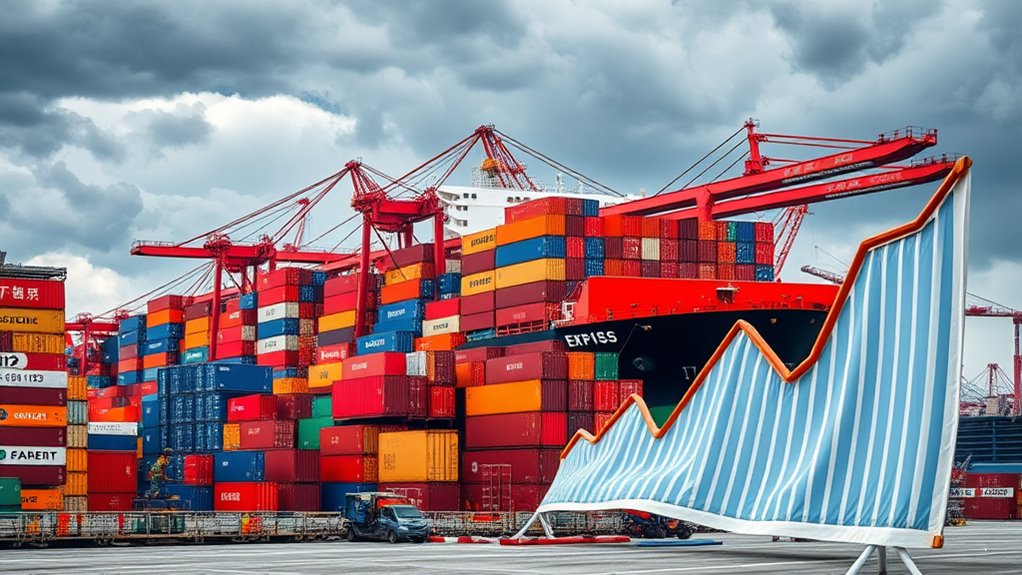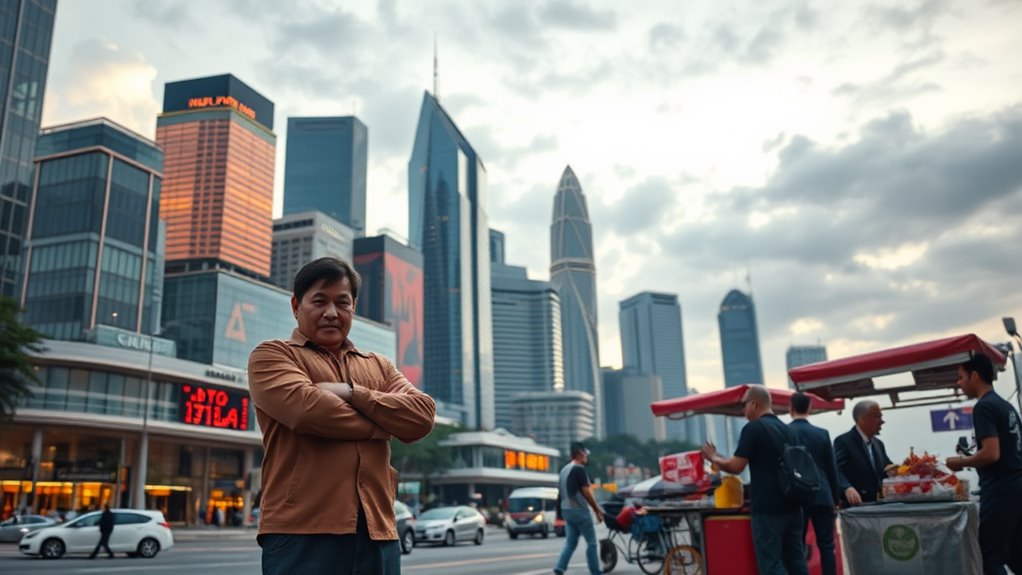You might think the US-China trade war doesn't really affect Singapore, but you'd be surprised. This global tussle is causing some serious waves in our economy. From slower GDP growth to changing trade volumes, the impact is real and far-reaching. Curious about how this trade conflict is reshaping our economic landscape? Let's break down the seven ways it's shaking things up in Singapore.
Slower GDP Growth Projections
As the US-China trade war continues to shake up global markets, Singapore's economy is feeling the tremors. Analysts predict a dip in GDP growth, dropping to 2.6% in 2025 from a previous estimate of 4% for 2024. This slowdown's a clear signal of the challenges ahead.
You see, the trade tensions create uncertainty, weakening business sentiment and impacting growth drivers.
Economic forecasting indicates a potential 0.4% decline in Q1 2026, thanks to these ongoing conflicts. With reduced Chinese exports to the US, demand for Singaporean goods could drop.
Sure, easing monetary conditions and big infrastructure projects might help, but the general outlook remains cautious. Embracing change and innovation will be vital for a resilient future!
Impact on Trade Volumes With China
While the US-China trade war rages on, Singapore's trade volumes with China are taking a hit. This is a significant deal because of our trade dependency on China.
Here's what you need to know:
- Reduced Chinese exports to the US mean less demand for Singapore's goods.
- Analysts predict a potential GDP slowdown of 0.4% by Q1 2026.
- The interconnectedness of global trade means disruptions here affect us all.
- Economic diversification is essential to buffer against these shocks.
As trade volumes shrink, we need to rethink our strategies.
It's time to investigate new markets and reduce our reliance on one major partner.
Embracing change can set us free!
Ripple Effects of Tariffs on Exports

The ripple effects of US tariffs on Chinese goods are hitting Singapore's exports harder than you might think.
As China feels the pinch, your export dynamics could take a hit too. With reduced demand for Chinese products in the US, countries like Singapore might see their trade volumes drop.
This isn't just a minor hiccup; analysts predict a 0.4% slowdown in GDP by Q1 2026. Tariff implications are real and they ripple through the economy.
Businesses here might face lower export performance and decreased investment, thanks to all the uncertainty.
Remember, Singapore's strong reliance on external trade means that any shake-up in China's supply chains can directly affect you.
Stay aware, and navigate these turbulent waters wisely!
Deteriorating Business Sentiment
Deteriorating business sentiment is becoming a real concern in Singapore, especially with the ongoing US-China trade war throwing a wrench in the works.
As analysts predict, this uncertainty is directly affecting investment decisions and the general economic outlook.
Here's what you need to know:
- A potential GDP slowdown of 0.4% is expected in Q1 2026.
- Business investment is closely linked to export performance.
- Trade uncertainties are souring sentiment in upcoming quarters.
- While major infrastructure projects may enhance business confidence, the negativity lingers.
The ongoing tensions create a challenging environment for businesses.
You might feel the pressure, but remember, every cloud has a silver lining!
Stay informed, and let's navigate these tricky waters together.
Investment Hesitation Amid Uncertainty

As companies face the ongoing uncertainty from the US-China trade war, hesitating to invest in new projects has become the norm. You might notice that businesses are rethinking their investment strategies. Concerns about tariffs and trade disruptions loom large.
This cautious climate could slow economic growth by about 0.4% in Q1 2026.
While easing monetary conditions might help, it's not a magic fix. The unpredictability makes companies more cautious. Major infrastructure projects could enhance confidence, but in general, the sentiment remains wary.
To thrive, businesses need market adaptability. They must stay agile and ready to pivot. Embracing this adaptability can help navigate the stormy waters of uncertainty and seize opportunities when they arise.
Vulnerabilities in Regional Economic Ties
While trade tensions between the US and China may seem distant, they directly impact Singapore's economy.
You've got to understand that Singapore's trade dependencies and economic interlinkages with these giants make it vulnerable.
Here's how:
- Disrupted trade volumes: Trade disputes can lower Singapore's exports.
- Investment hesitance: Companies might think twice about investing amid uncertainty.
- Regional downturns: Struggles in larger economies like the EU and China can ripple through ASEAN.
- Tariff impacts: Increased tariffs can slow growth across the region, hitting Singapore hard.
These vulnerabilities highlight just how interconnected our economies are.
If one major player stumbles, everyone feels it.
It's essential to stay aware and adaptable in this shifting landscape!
Need for Strategic Adaptation and Resilience

Understanding the need for strategic adaptation is vital for Singapore's economy, especially in the current unpredictable trade climate. The US-China trade war has thrown us into a whirlwind of uncertainty.
To thrive, you've got to focus on market diversification and supply chain resilience. It's not just smart; it's fundamental! Companies here must rethink their plans, exploring new markets to stay competitive.
Sure, major infrastructure projects can help, but you can't rely solely on that. Delayed investments are a real concern, so agility is key.
Keep engaging with both the US and China. By doing this, you'll safeguard Singapore's interests and navigate these turbulent waters.
Welcome change, and watch the economy adapt and flourish!
Conclusion
In summary, the US-China trade war is shaking up Singapore's economy like a snow globe. Slower growth, falling trade volumes, and cautious investors are all part of the picture. It's clear that Singapore needs to adapt and diversify its economic ties. Embracing change can be tough, but it's crucial for staying strong in uncertain times. By reevaluating strategies, Singapore can navigate these challenges and emerge resilient, ready to seize new opportunities!